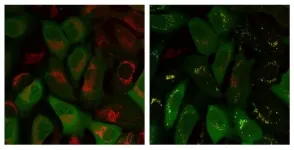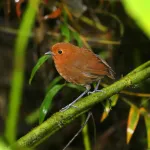The truth about doublespeak: Is it lying or just being persuasive?
2021-04-08
(Press-News.org) Doublespeak, or the use of euphemisms to sway opinion, lets leaders avoid the reputational costs of lying while still bringing people around to their way of thinking, a new study has found.
Researchers at the University of Waterloo found that the use of agreeable euphemistic terms biases people's evaluations of actions to be more favourable. For example, replacing a disagreeable term, "torture," with something more innocuous and semantically agreeable, like "enhanced interrogation."
"Like the much-studied phenomenon of 'fake news,' manipulative language can serve as a tool for misleading the public, doing so not with falsehoods but rather with the strategic use of euphemistic language," said Alexander Walker, lead author of the study and a PhD candidate in cognitive psychology at Waterloo. "The avoidance of objectively false claims may provide the strategic user of language with plausible deniability of dishonesty, thus protecting them from the reputational cost associated with lying."
As part of a series of studies investigating the effectiveness, consequences and mechanisms of doublespeak in a psychological context, the researchers investigated whether the use of language characteristic of doublespeak can be used to influence peoples' evaluations of actions.
The researchers identified doublespeak as the strategic manipulation of language to influence the opinions of others by representing the truth in a manner that benefits one's self. To do this, the researchers assessed whether substituting an agreeable term--for example, "working at a meat-processing plant" in place of a semantically related disagreeable term like "working at a slaughterhouse"--has an impact on how a person's actions are interpreted.
The researchers' results confirmed that peoples' evaluations of an action can be biased in a predictable, self-serving way when an individual employs the strategic use of more or less agreeable terms when describing an action.
"Our study shows how language can be used strategically to shape peoples' opinions of events or actions," Walker said. "With a lower level of risk, individuals may be able to utilize linguistic manipulation, such as doublespeak, often without correction."
INFORMATION:
The study, Controlling the Narrative: Euphemistic Language Affects Judgments of Actions while Avoiding Perceptions of Dishonesty, authored by Waterloo's Faculty of Arts researchers Walker, Jonathan Fugelsang, Martin Turpin, Ethan Meyers, Derek Koehler and Jennifer Stolz, appears in the journal Cognition.
ELSE PRESS RELEASES FROM THIS DATE:
2021-04-08
Single-cell transcriptomic methods allow scientists to study thousands of individual cells from living organisms, one-by-one, and sequence each cell's genetic material. Genes are activated differently in each cell type, giving rise to cell types such as neurons, skin cells and muscle cells.
Single-cell transcriptomics allows scientists to identify the genes that are active in each individual cell type, and discover how these genetic differences change cellular identity and function. Careful study of this data can allow new cell types to be discovered, ...
2021-04-08
WHAT:
Researchers funded by the National Institutes of Health have developed a test to evaluate the expressive language skills of people with Down syndrome, a condition resulting from an extra copy or piece of chromosome 21. Expressive language is the use of words to convey meaning to others. Language delays are common in people with Down syndrome, and the study authors believe their test provides a more effective way to evaluate prospective language interventions, compared to current evaluation methods.
The study was conducted by Angela Thurman, Ph.D., of the University of California, Davis, and ...
2021-04-07
Cancer doctors may soon have a new tool for treating melanoma and other types of cancer, thanks to work being done by researchers at the University of Colorado Cancer Center.
In a paper published in the journal PNAS last month, CU Cancer Center members Mayumi Fujita, MD, PhD, Angelo D'Alessandro, PhD, Morkos Henen, PhD, MS, Beat Vogeli, PhD, Eric Pietras, PhD, James DeGregori, PhD, Carlo Marchetti, PhD, and Charles Dinarello, MD, along with Isak Tengesdal, MS, a graduate student in the Division of Infectious Diseases at the University of Colorado School of Medicine, detail their work on NLRP3, an intracellular complex that has been found to participate in melanoma-mediated inflammation, leading to tumor growth and progression. By ...
2021-04-07
ZANZIBAR CITY (April 7, 2021) - A new study revealed that a drastic reduction of deaths of one of Africa's rarest primates, the Zanzibar red colobus (Piliocolobus kirkii), followed the installation of four speedbumps along a stretch of road where the species frequently crossed.
Zanzibar red colobus are found only in the Zanzibar archipelago and classified as Endangered by the IUCN Red List. Reliant on Unguja Island's forests for their survival, around half of the species population is found in Jozani-Chwaka Bay National Park.
In the study, published ...
2021-04-07
Eight months after mild COVID-19, one in ten people still has at least one moderate to severe symptom that is perceived as having a negative impact on their work, social or home life. The most common long-term symptoms are a loss of smell and taste and fatigue. This is according to a study published in the journal JAMA, conducted by researchers at Danderyd Hospital and Karolinska Institutet in Sweden.
Since spring 2020, researchers at Danderyd Hospital and Karolinska Institutet have conducted the so-called COMMUNITY study, with the main purpose of examining immunity after COVID-19. In the first phase of the study in spring 2020, blood samples were collected from 2,149 employees at Danderyd Hospital, of whom about 19 percent had antibodies against SARS-CoV-2. Blood samples have since ...
2021-04-07
With a lethal, airborne virus spreading fast, hospitals had to change how they treated patients and policies for how caregivers provided that treatment. But for maternity patients and nurses some of those changes had negative outcomes, according to a new University of Washington study.
"We found that visitor restrictions and separation policies were harming families and nurses. The effects for patients included loneliness, isolation and mistrust, while nurses described mistrust and low morale," said Molly Altman, lead author of the study and assistant professor in the UW School of Nursing.
Importantly, Altman added, both nurses and patients described how COVID "amplified existing ...
2021-04-07
LA JOLLA--(April 7, 2021) When cells are stressed, chemical alarms go off, setting in motion a flurry of activity that protects the cell's most important players. During the rush, a protein called Parkin hurries to protect the mitochondria, the power stations that generate energy for the cell. Now Salk researchers have discovered a direct link between a master sensor of cell stress and Parkin itself. The same pathway is also tied to type 2 diabetes and cancer, which could open a new avenue for treating all three diseases.
"Our findings represent the earliest step in Parkin's alarm response that anyone's ever found by a long shot. ...
2021-04-07
New medicines for people who have diabetes seem to pop up all the time. Drugs that help the body break down carbohydrates, drugs that increase excretion of glucose in the urine, drugs that help muscles respond to insulin and drugs that stimulate the pancreas to produce it -- the list of pharmaceutical options to treat diabetes gets longer and longer.
The downside of this wealth of treatment options is that it can be difficult for health care providers to stay on top of the latest research and standards of care. Which medication is best for which patients? And what are the best medicines to prescribe that both lower blood glucose and reduce risk for cardiovascular disease?
Johns Hopkins Medicine endocrinologist ...
2021-04-07
How many species of birds are there in the world? It depends on whose count you go by. The number could be as low as 10,000 or as high as 18,000. It's tough to standardize lists of species because the concept of a "species" itself is a little bit fuzzy.
That matters because conserving biodiversity requires knowing what diversity exists in the first place. So biologists, led by University of Utah doctoral candidate Monte Neate-Clegg of the School of Biological Sciences, set out to compare four main lists of bird species worldwide to find out how the lists differ--and why. They found that although the lists agree on most birds, disagreements in some regions ...
2021-04-07
A new analysis of lung epithelial cells from COVID-19 patients reveals how the protective complement branch of the immune system, which usually plays roles in both innate and adaptive immunity, can convert to a harmful system during COVID-19. Blocking excessive complement activity in lung epithelial cells with a combination of existing chemotherapy and antiviral medications - ruxolitinib and remdesivir, respectively - helped normalize the production of complement proteins by infected lung epithelial cells in human cell culture experiments, the researchers found. Thus, the drug duo could serve as a promising strategy to treat damaging inflammation during severe COVID-19, the authors say. Overactivation of complement proteins can contribute to diseases such as acute respiratory distress ...
LAST 30 PRESS RELEASES:
[Press-News.org] The truth about doublespeak: Is it lying or just being persuasive?



